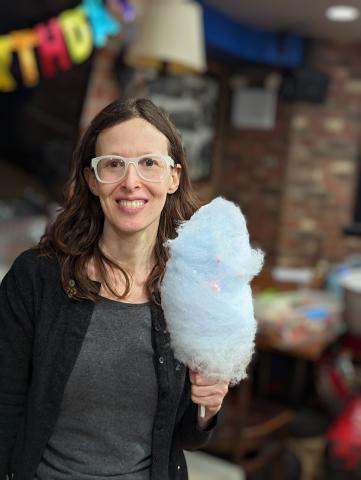Kimberly Kahn ’98 Finds Her Way Back to the College

When Kahn visited campus in the spring of her junior year in high school, it was love at first sight. For a kid who grew up in New York City, the campus was as bucolic as she could want. The size felt right, and so did the idea of being able to craft her own curriculum. She was relieved to get her acceptance letter and excited to be part of the College's vibrant intellectual community.
Kahn fell in with people quickly, becoming a late-night DJ at WAMH and working on Prism, the literary magazine. She hung out at the Hungry Newt, a coffee-and-pastry cart in the student center that became a hub for her artist and musician friends, and which she eventually co-ran in its own brick-and-mortar space in the basement of Garman House. She took fascinating courses with faculty like James Maraniss, professor of Spanish and European studies, and Austin Sarat, William Nelson Cromwell Professor of Jurisprudence and Political Science.
There were also moments of profound beauty and transformation. She recalls rollerblading on the bike trail, often encountering no one else for miles. “In the city, I learned to associate empty with danger—an empty block, an empty subway station—but this was different,” Kahn says. “The quiet and the birds and the space. It required a reorientation to being alone. Going fast on the smooth pavement, enjoying the full faculties of my body on a fall afternoon, was a lovely, liberating feeling.”
But there were moments of disaffection, too. Kahn felt alienated from the TAP-focused social life that prevailed on campus in the mid-nineties. “It felt like the whole college culture was over there, totally separate from my little corner of art majors, theater people and radio-station geeks over here,” she says. The dominant way of socializing at the College at that time didn’t feel welcoming to Kahn, and the vision she’d had as a high-school junior of Amherst as a bastion of intellectual seriousness didn’t feel true.
“My time at the College coincided with a cultural era that was not a good fit for me,” she says. “It’s fair to say that I didn’t feel a lot of Amherst pride.” She graduated magna cum laude with a degree in psychology and later went on to the Cornell University College of Veterinary Medicine.
That wasn’t the end of the story. Everything shifted when Anthony W. Marx became the College’s 18th president in 2003. “I didn’t have any notion that I’d become a donor to Amherst or feel connected to the College beyond the friendships I was going to keep up,” says Kahn. However, the changes President Marx began to make got her attention, drew her back, and ultimately were a turning point in her views of and relationship to the College. “It was amazing to see the school evolving, shifting, opening up—in terms of race, socio-economic status, and a real diversity of thought. I saw a president who was challenging the institution to become something better and bolder.”
It was during his tenure that Kahn began contributing to the Amherst Fund, and she has been a steadfast donor every year since. “Honestly, I felt envious. Here is a vision of the College that feels right to me, and I would have loved to experience this Amherst,” she says. “Giving to the Amherst Fund has been a way to engage that wish fulfillment, a tangible way I can participate in what the College is becoming.”
Kahn marvels at this turn of events. “My disaffection has turned to affection,” she says with a smile, grateful to feel more at home with Amherst now than she did as a student and appreciative of the time it took to get here. “Having a complicated, messy, weird relationship with the school has ultimately been more rewarding.”